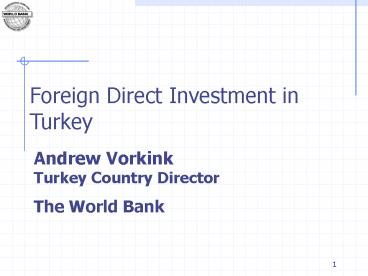Andrew Vorkink - PowerPoint PPT Presentation
1 / 14
Title:
Andrew Vorkink
Description:
Malaysia: SMART, Global Supplier Program. 11. Turkey's progress to date ... Reduce permissions needed to operate in mining and tourism. 13. Turkey's Agenda ... – PowerPoint PPT presentation
Number of Views:40
Avg rating:3.0/5.0
Title: Andrew Vorkink
1
Foreign Direct Investment in Turkey
Andrew Vorkink Turkey Country Director The World
Bank
2
Outline
- The role of FDI in the economy and FDI trends
- Key factors affecting FDI
- Turkeys progress to date and the remaining
agenda - Conclusions
3
FDI Sustainable growth and employment
- Potential to generate large capital inflows
- Gives access to foreign markets, especially in
multinational corporations (MNCs) countries - Efficient way to access foreign technology, in
turn increasing productivity - Preferred method of financing current account
deficits caused by episodes of rapid growth - Leads to knowledge, management and technology
transfers --if the right conditions are in place
4
But FDI does come with risks
- Possible abuse of dominant market position by
MNCs - Possible MNCs attempts to influence the political
process and coax concessions from governments in
return for location decisions - Possible increased volatility of balance of
payment flows - Possible that MNCs continue to do business
exclusively with parent companies, without
generating local transfer of knowledge and
technology
5
The role of FDI in the global economy is growing
steadily
- MNCs do about 2/3 of world trade
- About 30-40 of this trade is within MNCs
- MNC export activity is taking new forms global
production networks, with very fine vertical
specialization by function/component between
countries - FDI is growing faster than other economic
factors national investment, GDP or exports - Local companies are also involved in global
production networks, but only if - They have very high levels of technological
capabilities and form strong ties with MNCs to
access and absorb their technological know-how
and management skills Skills and Education are
key
6
FDI in Turkey has been chronically low
FDI/GDP. International Comparison.
Bulgaria
EU 8
China
Turkey
While worldwide FDI has increased by a factor of
12 in the last ten years, in Turkey it has been
stagnant since the mid-90s. While now growing, it
was less than 1 of GDP in 2004.
7
Quality also matters RD-intensive FDI to the
whole ECA Region is close to negligible
US Multinationals RD (US million)
South and East Asia
East Europe
8
Traditional key factors of FDI location
- Some remain relevant
- Stable macroeconomic environment
- Stable, transparent and welcoming policies
- Large and/or fast growing markets
- Primary resources
- Cheap and trainable labor
- But others are becoming less important
- Cheap unskilled labour
- Protected markets
9
New factors in FDI location and to establish
links with the local economy
- Strong legal systems and property rights
- Low transaction costs (entry, exit, expansion,
taxation, customs, employment, cross-border MAs) - Modern ICT infrastructure and logistics plus RD
- Human capital new skills, flexible practices,
training provisions, ease of expatriate entry - Strong supplier and service networks
- Effective FDI promotion, targeting and
coordination with supply side policies
10
How to promote supplier linkages with MNCs?
- Local content rules are often inefficient and
are now forbidden by the WTO - Fiscal incentives are costly and can only play an
initial stimulating role - What works best
- Improving supplier capabilities, directly and
with MNC assistance - Matchmaking, information dissemination
- International best practice
- Ireland comprehensive strategy to attract FDI
- Malaysia SMART, Global Supplier Program
11
Turkeys progress to date
- Macroeconomic stability
- EU accession
- FDI Act in June 2003
- Eliminated the minimum capital investment
requirement (US50,000) no need to obtain
approval from the foreign Investment General
Directorate foreign firms allowed to invest in
real estate - Improvement in several aspects of the business
environment (e.g., reduction of tariff and
non-tariff barriers, reduction of corruption)
12
Turkeys Agenda
- Consolidate macroeconomic stabilization by
removing vulnerabilities - Further improve the investment climate
- Reform financial and capital markets
- Reduce administrative procedures for firms
operation focus on licensing, registration
costs and exit procedures - Reduce corporate tax and improve tax
administration - Improve efficiency of the judiciary for business
dispute resolution - Remove remaining regulatory constraints on
foreign ownership - Reduce limitations on foreign investment in civil
aviation, fishery, maritime transport and
broadcasting - Reduce permissions needed to operate in mining
and tourism
13
Turkeys Agenda
- Improve competition levels and reduce industrial
concentration - Continue with accelerated privatization
- Monitor and reduce State Aid
- Strengthening anti-monopolistic behaviour of
large groups - Continue successful implementation of anti-trust
policies - Increase use of quality standards and technology
among local firms and improve the skills of the
labor force - Quality align legislation to EU, reform
Standards and Quality Agency (TSE), increase
firms and labs use of standards - Technology Foster technology adoption at the
firm level reform TUBITAK and create a new
innovation agency align IPR legislation with
Acquis and improve IPR enforcement - Strengthen skills by modernizing the higher
education admission system and reforming
curricula at all levels
14
Conclusion
- Turkey is fully committed to a modern and
efficient economy as a mean to improve the life
of its citizens - FDI is an important ingredient in achieving this
objective - There is strong competition in attracting FDI and
while Turkey has made great progress, important
challenges remain - The agenda ahead is clear and the country has the
ability to meet these challenges































